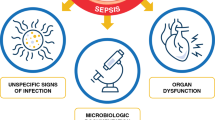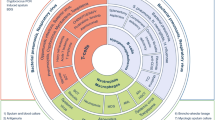Abstract
Objectives
To identify predictors associated with adverse outcome in febrile neutropenic episodes among pediatric oncology patients between 1 and 18 y age, to ascertain the prevalence of invasive bacterial or fungal infection/mortality, to determine the common organisms causing invasive bacterial infection in children with febrile neutropenia and to evaluate their current antimicrobial sensitivity pattern.
Methods
It was an observational descriptive study conducted between February 2009 through July 2010. Febrile neutropenic episodes satisfying the inclusion criteria were enrolled. Relevant history was taken followed by a detailed clinical examination and laboratory examination. Logistic Regression analysis was used to identify significant predictors of adverse outcome in febrile neutropenic episodes.
Results
Out of the 155 febrile neutropenic episodes studied, adverse outcome occurred in 53(34 %) of the episodes. History of three or more previous episodes of febrile neutropenia, child being already on oral antibiotics and Chest Radiograph abnormality at presentation were found to be significantly associated with adverse outcome on multivariate logistic regression analysis. Documented invasive bacterial and fungal infection was seen in 27.8 % and 14.2 % episodes. Mortality occurred in 8 (5 %) of episodes. Gram negative bacterial infections were more common. Most common bacteria isolated was Escherichia coli and the commonest gram positive organism isolated was Staphylococcus aureus (MSSA).
Conclusions
On multivariate analysis, the variables found to be significantly associated with adverse outcome in febrile neutropenic episodes were three or more previous episodes of febrile neutropenia, child being already on oral antibiotics and Chest Radioraph abnormality at presentation.




Similar content being viewed by others
References
Klaassen RJ, Goodman TR, Pham B, et al. “Low-risk” prediction rule for pediatric oncology patients presenting with fever and neutropenia. J Clin Oncol. 2000;18:1012–9.
Seth R, Bhat AS. Management of common oncologic emergencies. Indian J Pediatr. 2011;78:709–17. Epub 2011 Mar 12. PubMed PMID: 21399956.
Feld R. Bloodstream infections in cancer patients with febrile neutropenia. Int J Antimicrob Agents. 2008;32 Suppl 1:S30–3.
Paganini HR, Aguirre C, Puppa G, Garbini C, Javier RG, Ensinck G, et al. Cancer. 2007;109:2572–9.
Maghraby EL, Mohamed Moneer S, Mohamed M, et al. The Diagnostic value of C-Reactive Protein, Interleukin-8 and Monocyte Chemotactic Protein in risk stratification of febrile neutropenic children with hematologic malignancies. J Ped Hemat Oncol. 2007;29:131–6.
Gaur AH, Flynn PM, Shenep JL. Optimum management of pediatric patients with fever and neutropenia. Indian J Pediatr. 2004;71:825–35. Review. PubMed PMID: 15448391.
Hakim H, Flynn PM, Srivastava DK, et al. Risk prediction in pediatric cancer patients with fever and neutropenia. Pediatr Infect Dis J. 2010;29:53.
Basu SK, Fernandez ID, Fisher SG, Asselin BL, Lyman GH. Length of stay and mortality associated with febrile neutropenia among children with cancer. J Clin Oncol. 2005;23:7958–66.
Hodgson-Viden H, Grundy PE, Robinson JL. Early discontinuation of intravenous antimicrobial therapy in pediatric oncology patients with febrile neutropenia. BMC Pediatr. 2005;5:10.
Talcott JA, Finberg R, Mayer RJ, Goldman L. The medical course of cancer patients with fever and neutropenia. Clinical identification of a low-risk subgroup at presentation. Arch Intern Med. 1988;148:2561–8.
Mathur P, Chaudhry R, Kumar L, Kapil A, Dhawan B. A study of bacteremia in febrile neutropenic patients at a tertiary-care hospital with special reference to anaerobes. Med Oncol. 2002;19:263–72.
Klastersky J, Paesmans M, Rubenstein EB, et al. The Multinational Association for Supportive Care in Cancer risk index: a multinational scoring system for identifying low risk febrile neutropenic cancer patients. J Clin Oncol. 2000;18:3038–51.
Nelly H, Ali E-D, Iman S, Zamzam MA, El-Mahalaway HA. Blood Stream infection in pediatric cancer patients, epidemiology and outcome analysis. J Egyp Nat Can Instit. 2003;15:363–72.
Lai H-P, Hsueh P-R, Chen Y-C, et al. Bacteremia in haematological and oncological children with febrile neutropenia: experience in a tertiary medical center in Taiwan. J Microbiol Immunol Infect. 2003;36:197–202.
Zareifar S, Sharifian M. Zinc supplement may be effective in febrile neutropenia. Indian J Pediatr. 2007;74:964–5.
Santolaya ME, Alvarez AM, Becker A, et al. Prospective, multicenter evaluation of risk factors. Oncol. 2001;19:3415–21.
Bakhshi S, Padmanjali KS, Arya LS. Infections in childhood acute lymphoblastic leukemia: a retrospective analysis of 222 febrile neutropenic episodes. Pediatric Hematol Oncol. 2008;25:385–92.
Dubey AP, Singhal D, Prakash SK. Febrile episodes in childhood malignancies. Indian Pediatr. 2002;39:952–7.
Conflict of Interest
None.
Role of Funding Source
Indian Council of Medical Research (ICMR) provided grant for the present study.
Author information
Authors and Affiliations
Corresponding author
Rights and permissions
About this article
Cite this article
Bothra, M., Seth, R., Kapil, A. et al. Evaluation of Predictors of Adverse Outcome in Febrile Neutropenic Episodes in Pediatric Oncology Patients. Indian J Pediatr 80, 297–302 (2013). https://doi.org/10.1007/s12098-012-0925-3
Received:
Accepted:
Published:
Issue Date:
DOI: https://doi.org/10.1007/s12098-012-0925-3




